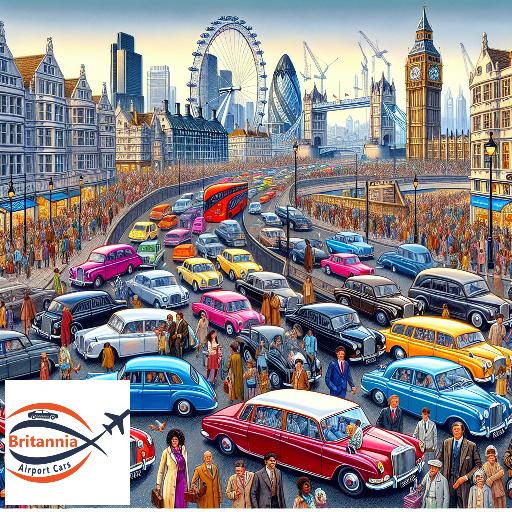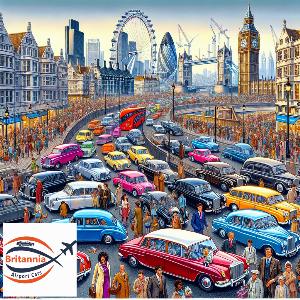Londons Industrial Past: Exploring Warehouses and Factories

The Docklands
The Docklands, a significant part of London's industrial past, is a testament to the city's rich maritime history. Once the heart of London's thriving port industry, the Docklands were home to numerous warehouses and factories that played a crucial role in the city's economic growth. Today, these industrial relics have been transformed into modern apartments, offices, and cultural spaces, yet they still retain their original architectural charm. The towering Victorian warehouses, with their red-brick facades and large, multi-paned windows, are a stark reminder of the area's bustling past. The old factories, with their robust structures and high ceilings, echo the sounds of machinery and labor that once filled the air. Exploring the Docklands is like stepping back in time, offering a glimpse into London's industrial past and the city's evolution over the centuries. This area is a must-visit for history enthusiasts and architecture lovers alike.
Battersea Power Station
Battersea Power Station, an iconic symbol of London's industrial past, stands as a testament to the city's rich history of manufacturing and power generation. Constructed in the 1930s, this colossal structure was once the largest brick building in Europe, its four towering chimneys dominating the city's skyline. The power station was a vital cog in London's industrial machine, supplying a fifth of the city's electricity at its peak. Despite ceasing operations in 1983, the power station's distinctive Art Deco architecture continues to captivate onlookers, embodying the spirit of London's industrial era. Today, Battersea Power Station is undergoing a transformation into a multi-use development, blending residential, commercial, and entertainment spaces. Yet, its industrial heritage remains preserved, a reminder of London's past as a powerhouse of manufacturing and industry. This iconic landmark serves as a tangible link to the city's industrial past, a monument to the warehouses and factories that once defined London's landscape.
Tate Modern
Tate Modern, a beacon of London's industrial past, stands as a testament to the city's rich history of warehouses and factories. Once a former power station, this iconic building on the banks of the River Thames has been transformed into one of the world's leading contemporary art galleries. The building's industrial roots are evident in its design, with the towering chimney and vast turbine hall paying homage to its past. The cavernous spaces, once filled with machinery, now house thought-provoking art installations. The Tate Modern is a perfect example of how London's industrial past has been repurposed for the present, blending history with modernity. It serves as a reminder of the city's evolution from a hub of manufacturing and trade to a global centre for culture and creativity. This fusion of old and new makes the Tate Modern a must-visit destination for those interested in exploring London's industrial heritage.
The Granary Complex
The Granary Complex, a testament to London's industrial past, stands as a remarkable symbol of the city's rich history. Once a bustling hub of trade and commerce, these warehouses and factories were the lifeblood of the city's economy. Today, they offer a fascinating glimpse into the past, showcasing the architectural prowess of the era. The complex, with its imposing brick structures, was originally designed for storing grain, a vital commodity in the 19th century. The warehouses, with their high ceilings and vast spaces, were used for manufacturing goods, reflecting the city's industrial prowess. Today, these structures have been repurposed, housing art galleries, restaurants, and offices, yet they retain their original charm. Exploring the Granary Complex is like stepping back in time, offering a unique perspective on London's industrial past. It stands as a reminder of the city's evolution, from a thriving industrial hub to a modern metropolis, making it a must-visit for history enthusiasts.
Wapping Hydraulic Power Station
Wapping Hydraulic Power Station, a testament to London's industrial past, stands as a symbol of the city's rich history. Built in 1890, this former power station was once the beating heart of London's docklands, powering machinery across the city. Its red-brick exterior and towering chimney are iconic features of the London skyline, reflecting the architectural style of the Victorian era. Inside, the station houses a labyrinth of pipes, engines, and hydraulic accumulators, a fascinating sight for those interested in industrial machinery. After its closure in 1977, the power station was repurposed as an arts centre and restaurant, preserving its historical significance while adapting to modern needs. Today, the Wapping Hydraulic Power Station serves as a reminder of London's industrial heritage, offering a glimpse into the city's past while contributing to its vibrant cultural scene. This unique blend of history and modernity makes it a must-visit for anyone interested in exploring London's industrial past.
The Printworks
The Printworks, a testament to London's industrial past, is a unique venue that breathes life into the city's history. Once a printing factory for the Evening Standard, it has been transformed into a multi-purpose space, retaining its industrial charm. The cavernous press halls, now used for cultural events, are a stark reminder of the city's manufacturing heritage. The Printworks is a perfect example of how London's old warehouses and factories are being repurposed for modern use, while still preserving their historical significance. The venue's raw aesthetic, with its exposed machinery and towering ceilings, offers a tangible link to the city's industrial past. Exploring The Printworks is like stepping back in time, offering a glimpse into the bustling activity that once filled London's factories and warehouses. This venue is a must-visit for anyone interested in the city's history, architecture, or simply looking for an extraordinary experience.
The Roundhouse
The Roundhouse, a testament to London's industrial past, stands as a beacon of architectural resilience. Originally built in 1847 as a steam-engine repair shed, it was later transformed into a warehouse before becoming a renowned arts venue. Its distinctive circular design, a necessity for the locomotives it once housed, is a unique feature that sets it apart from the typical rectangular warehouses and factories of the era. The Roundhouse's robust brickwork and vast interior space reflect the industrial strength and capacity of London's manufacturing heyday. Today, it serves as a reminder of the city's rich industrial heritage, while its adaptive reuse demonstrates the potential for preserving historical structures in a modern context. Exploring the Roundhouse offers a fascinating glimpse into London's past, where the echoes of steam engines can almost be heard amidst the contemporary performances that now fill its space. This iconic structure is a must-visit for anyone interested in the intersection of history, industry, and architecture.
The Truman Brewery
The Truman Brewery, a beacon of London's industrial past, stands as a testament to the city's rich history of manufacturing and trade. Once the largest brewery in the world, it was a hub of activity, producing thousands of barrels of beer daily. Today, the red-brick warehouse, located in the heart of East London, is a vibrant cultural venue, hosting a variety of events, exhibitions, and independent businesses. The brewery's transformation from an industrial powerhouse to a creative hub mirrors the evolution of London itself. The vast, open spaces that once housed brewing vats and machinery now serve as a canvas for artists, designers, and entrepreneurs. The Truman Brewery is a tangible link to London's industrial past, a reminder of the city's dynamic history and a symbol of its innovative future. It stands as a unique blend of the old and new, embodying the spirit of London's ever-evolving landscape.
The Loom
The Loom, a refurbished Victorian wool warehouse in London's Whitechapel, stands as a testament to the city's rich industrial past. This architectural marvel, once a bustling hub of textile production, now serves as a creative workspace, but its history is still palpable. The building's original brickwork, high ceilings, and large windows hark back to a time when London was the heart of the global textile industry. The Loom's transformation is emblematic of the wider changes in London, where old factories and warehouses are being repurposed for modern use. These structures, once the backbone of London's economy, are now home to innovative businesses and cultural institutions. Exploring these spaces offers a fascinating glimpse into the city's industrial heritage, a reminder of the sweat and toil that fuelled London's growth. The Loom, with its blend of old and new, embodies the spirit of a city that never stops evolving.
The Biscuit Factory
The Biscuit Factory, a testament to London's industrial past, stands as a remarkable symbol of the city's rich history. Once a bustling hub of production, this former biscuit manufacturing site has been transformed into a vibrant creative arts space, while still retaining its original industrial charm. The factory's red brick walls, high ceilings, and large windows are reminiscent of the city's bygone era of manufacturing and trade. The Biscuit Factory is a fascinating example of how London's old warehouses and factories have been repurposed for modern use, without losing their historical significance. It offers a unique glimpse into the city's industrial past, while also serving as a thriving centre for contemporary arts and culture. This blend of old and new makes The Biscuit Factory a must-visit destination for those interested in exploring London's rich industrial heritage.
Our Latest Blog Posts

Family Fun in London: Kid-Friendly Activities and Attractions
Blog about Family Fun in London: Kid-Friendly Activities and Attractions
Read More
Londons Festive Spirit: Celebrating Holidays in the Capital
Blog about Londons Festive Spirit: Celebrating Holidays in the Capital
Read More
Literary London: A Book Lovers Guide to Famous Literary Locations
Blog about Literary London: A Book Lovers Guide to Famous Literary Locations
Read More
Londons Diverse Flavors: Exploring International Cuisine
Blog about Londons Diverse Flavors: Exploring International Cuisine
Read More
Cultural Delights: Londons Top Galleries and Exhibitions
Blog about Cultural Delights: Londons Top Galleries and Exhibitions
Read More
Tube Tales: Navigating Londons Underground Like a Pro
Blog about Tube Tales: Navigating Londons Underground Like a Pro
Read More
Day Trips from London: Exploring the Countryside and Beyond
Blog about Day Trips from London: Exploring the Countryside and Beyond
Read More
Londons Waterfront Wonders: Canals, Docks, and More
Blog about Londons Waterfront Wonders: Canals, Docks, and More
Read More
London for Thrill-Seekers: Adrenaline-Pumping Activities
Blog about London for Thrill-Seekers: Adrenaline-Pumping Activities
Read More
The Ultimate Harry Potter Tour: Filming Locations and More
Blog about The Ultimate Harry Potter Tour: Filming Locations and More
Read More
Londons Musical Melodies: From Abbey Road to Iconic Concert Halls
Blog about Londons Musical Melodies: From Abbey Road to Iconic Concert Halls
Read More
Springtime in London: Cherry Blossoms and Blooming Gardens
Blog about Springtime in London: Cherry Blossoms and Blooming Gardens
Read More
The Perfect Weekend in London: A 48-Hour Itinerary
Blog about The Perfect Weekend in London: A 48-Hour Itinerary
Read More
Londons East End: Trendy Neighborhoods and Street Art
Blog about Londons East End: Trendy Neighborhoods and Street Art
Read More
Romantic Rooftops: A Guide to Londons Best Skyline Views
Blog about Romantic Rooftops: A Guide to Londons Best Skyline Views
Read More
Londons Haunted History: Spooky Sites and Ghostly Tales
Blog about Londons Haunted History: Spooky Sites and Ghostly Tales
Read MoreBlog 1 Posts
- Londons Multicultural Melting Pot: Ethnic Enclaves and Festi
- Revolutionary Routes: Exploring Londons Political History
- Whispers of Whimsy: Fairy-Tale Adventures in London
- Hidden Histories: Unearthing Londons Forgotten Landmarks
- The Great Outdoors: Hiking and Nature Trails Near London
- Nautical Nostalgia: Exploring Londons Maritime Heritage
- Artisanal Eats: Farmers Markets and Local Producers in Londo
- Riverside Retreats: Quaint Towns and Villages Along the Tham
- Neon Nights: Londons Electric Street Scenes After Dark
- Londons Festive Markets: Holiday Shopping Extravaganza
- Museum Marathons: A Day of Art and Culture in London
- Chasing Shadows: Londons Most Haunted Places
- East Meets West: Exploring Londons Cultural Fusion
- Tranquil Temples: Spiritual Retreats in the Heart of London
- Cycle City: Biking Adventures and Trails in London
- Seasonal Splendors: London in Autumn, Winter, Spring, and Su
